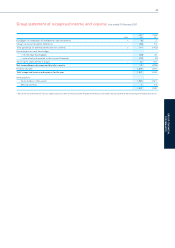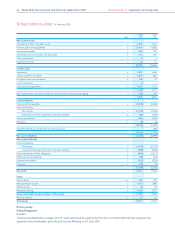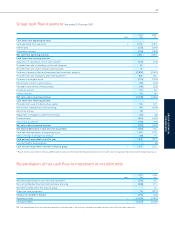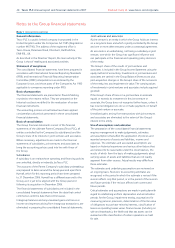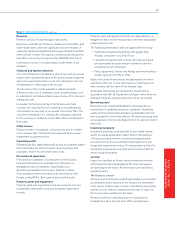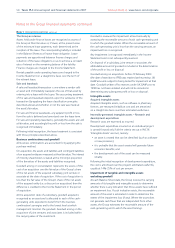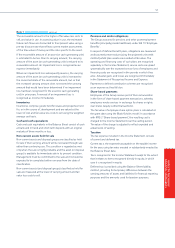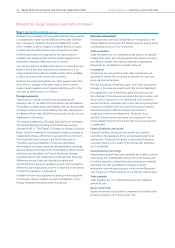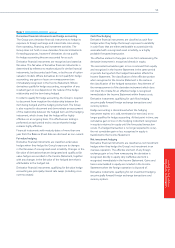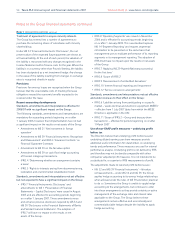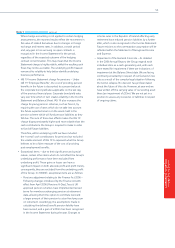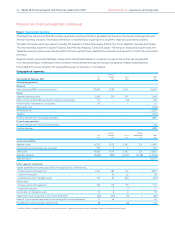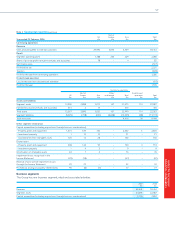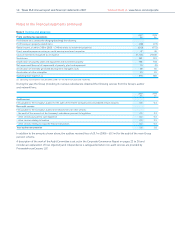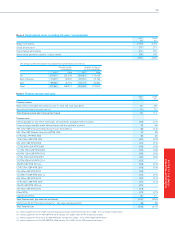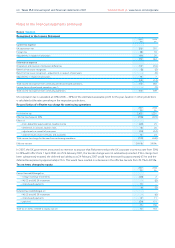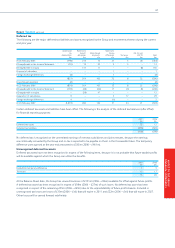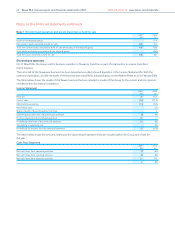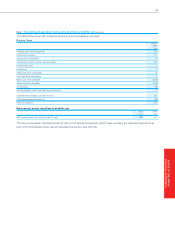Tesco 2007 Annual Report Download - page 57
Download and view the complete annual report
Please find page 57 of the 2007 Tesco annual report below. You can navigate through the pages in the report by either clicking on the pages listed below, or by using the keyword search tool below to find specific information within the annual report.
Where hedge accounting is not applied to certain hedging
arrangements, the reported results reflect the movement in
fair value of related derivatives due to changes in foreign
exchange and interest rates. In addition, at each period
end, any gain or loss accruing on open contracts is
recognised in the Income Statement for the period,
regardless of the expected outcome of the hedging
contract on termination. This may mean that the Income
Statement charge is highly volatile, whilst the resulting cash
flows may not be as volatile. The underlying profit measure
removes this volatility to help better identify underlying
business performance.
• IAS 19 Income Statement charge for pensions – Under
IAS 19 ‘Employee Benefits’, the cost of providing pension
benefits in the future is discounted to a present value at
the corporate bond yield rates applicable on the last day
of the previous financial year. Corporate bond yield rates
vary over time which in turn creates volatility in the Income
Statement and Balance Sheet. IAS 19 also increases the
charge for young pension schemes, such as Tesco’s, by
requiring the use of rates which do not take into account
the future expected returns on the assets held in the
pension scheme which will fund pension liabilities as they
fall due. The sum of these two effects makes the IAS 19
charge disproportionately higher and more volatile than the
cash contributions the Group is required to make in order
to fund all future liabilities.
Therefore, within underlying profit we have included
the ‘normal’ cash contributions for pensions but excluded
the volatile element of IAS 19 to represent what the Group
believes to be a fairer measure of the cost of providing
post-employment benefits.
• Exceptional items – due to their significance and special
nature, certain other items which do not reflect the Group’s
underlying performance have been excluded from
underlying profit. These gains or losses can have a
significant impact on both absolute profit and profit trends,
consequently, they are excluded from the underlying profit
of the Group. In 2006/07, exceptional items are as follows:
– Pensions adjustment relating to the Finance Act 2006 –
Following changes introduced by the Finance Act with
effect from April 2006 (Pensions A-Day), Tesco’s UK
approved pension schemes have implemented revised
terms for members exchanging pension at retirement
date, allowing them the option to commute (convert)
a larger amount of their pension to a tax-free lump sum
on retirement. Accordingly, the assumptions made in
calculating the defined benefit pension liability have
been revised, and a gain of £250m has been recognised
in the Income Statement during the year. Changes to
scheme rules in the Republic of Ireland affecting early
retirement have reduced pension liabilities by a further
£8m, which is also recognised in the Income Statement.
Future revisions to the commutation assumption will be
reflected within the Statement of Recognised Income
and Expense.
– Impairment of the Gerrards Cross site – As detailed
in the 2006 Annual Report, the Group regards each
individual store as a cash-generating unit, with each
store tested for impairment if there are indications of
impairment at the Balance Sheet date. We are facing
continuing uncertainty in respect of our Gerrards Cross
site as a result of the complex legal situation following
the tunnel collapse. No decision has yet been taken
about the future of this site. However, at year end we
have written off the carrying value of our existing asset
there (an impairment of £35m). We are not yet in a
position to assess any recoveries or liabilities in respect
of ongoing claims.
55
NOTES TO THE GROUP
FINANCIAL STATEMENTS
Note 1 Accounting policies continued


